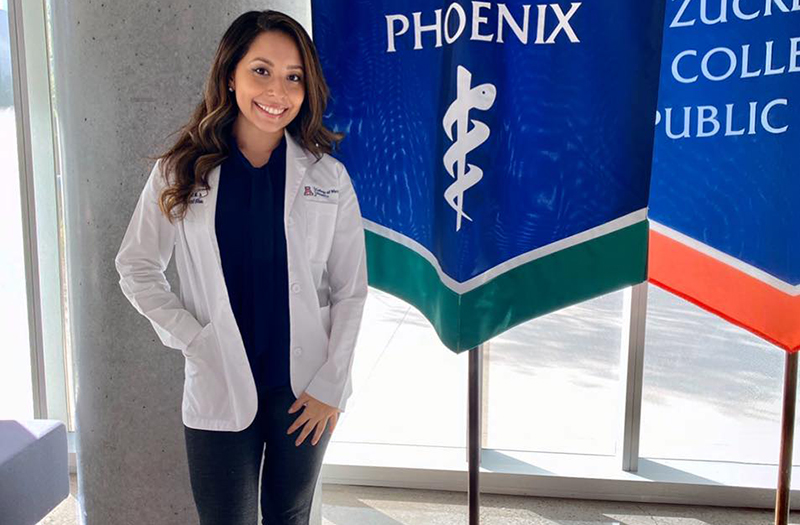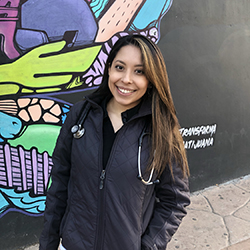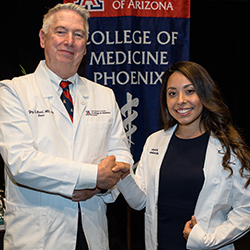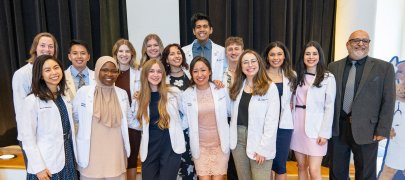
Primary Care Scholarship Profile: Abigail Rocio Solorio

To address the alarming physician shortage in Arizona, the University of Arizona College of Medicine – Phoenix has accepted eight medical students to receive tuition reimbursement in exchange for a commitment to practice in a rural or urban underserved community in Arizona. The University of Arizona Primary Care Physician Program, developed in partnership with and funded by a portion of $8 million provided by the State of Arizona, is part of the University's commitment to increase primary care providers in underserved communities statewide, and decrease medical student debt. The program was announced in November 2019. Once the program is fully implemented, about 100 students from the Colleges of Medicine (Phoenix and Tucson) could receive the reimbursement.
The UA College of Medicine – Phoenix is profiling several of the students who have committed their careers to primary care.
Meet Abigail Rocio Solorio

Solorio graduated from North High School in Phoenix with an International Baccalaureate certificate. She graduated from the University of Arizona with a bachelor’s degree in Neuroscience and Cognitive Science with minors in Physiology and Psychology. As part of the UA College of Medicine – Phoenix Pathway Scholars Program, she graduated with a Master of Medical Studies in 2019.
In her first year as a medical student, she is enrolled in the Service and Community Health Certificate of Distinction, is a member of the medical school’s Diversity and Inclusion Committee and president of the Latino Medical Student Association. Solorio decided she wanted to be a physician after realizing that she had never met a doctor who “looked like me, spoke my native language or took the time to understand my situation.” She wants to dedicate her life to being the voice for vulnerable populations.
“I am committed to medicine because there is no greater gift than to serve the people and give back to the community that raised me into the person I am today.”
Why Did You Commit to Primary Care?
As a minority, I have witnessed health care disparities. I am committed to primary care because I want to be able to bring my personal background and life experience to my profession. I have a social awareness about the issues and consequences that come with poor access to health care. This has inspired me to become an advocate for my patients and connect with their stories. I believe the patient-doctor relationship is one of comfort, humility, integrity and dignity. This connection is what drives me to primary care.
What is the Best Part of Being a Primary Care Physician (PCP)?
Every provider sees their patients differently: Some may see them in emergent situations, others through specialized imaging modalities and some see them on the operating table, but as primary care physicians, we see our patients as whole. We have been taught to feel our patients’ emotions and be aware of problems that they might not be able to verbalize. In addition to empathizing with patients’ fears, we also listen to their family’s concerns. I want to connect with my patients, offer comfort during times of distress and inspire them to take control of their health, so that together, we can prevent secondary complications. The best part of being a primary care provider is that I can care for all people, from all backgrounds and all walks of life.
How Would You Explain to Someone Who Doesn't Know Anything About the Primary Care Shortage, Why PCPs are Needed?
Arizona is facing a shortage of primary care physicians specifically in rural and underserved communities. Patients with chronic disease are greatly impacted, as this creates a barrier for long-term management and continuity of care. The shortage will create greater health disparities and an inability to meet the needs of our community. Primary care physicians serve as the first point of contact for patients, so establishing a positive connection with a primary care provider can make the difference in a patient’s life.
Why are PCPs Important to the Community?
PCPs empower their patients to take control of their health. They are able to care for diverse populations with various medical conditions, but above all, recognize that each patient has a story to tell that is unique.
Why Do Medical Students Choose Not to Go into Primary Care?

What Does It Mean to be Selected for This Program?
As a first-generation college student, I did not have much direction throughout my educational journey. I knew that as an underrepresented minority coming from a socioeconomically disadvantaged background, my path may be different. I can recall the times I was confronted with prejudice and was told that my place was not in the medical field, but my passion was bigger than any rejection I encountered. Despite the challenges, I am grateful for this tremendous opportunity. This scholarship allows me to continue my education and focus on becoming a physician and serving the needs of my community. It reassures me that I have people who believe in my potential and are invested in my future.
Why Did You Choose the College of Medicine – Phoenix?
Growing up in Phoenix, it had been a dream of mine to attend the University of Arizona and apply to medical school. I remember driving to high school every day, and I would pass through downtown and see the College of Medicine – Phoenix expand its campus. I wished that one day I could continue my education there. I have always admired the University of Arizona for the value they place on serving a diverse population and pledging to optimize health care in our community and beyond. The faculty and support system in place at the college is truly invested in our professional development and personal well-being. The college is breaking boundaries in research and medical education with an innovative curriculum that is student-centered. We have clinical and community partners that allow us the chance to work directly in the community and alongside expert physicians. I chose the College of Medicine – Phoenix because they showed me that they believe in my passion just as much as I do, and they have given me every opportunity I could have imagined and more.
About the College
Founded in 2007, the University of Arizona College of Medicine – Phoenix inspires and trains exemplary physicians, scientists and leaders to optimize health and health care in Arizona and beyond. By cultivating collaborative research locally and globally, the college accelerates discovery in a number of critical areas — including cancer, stroke, traumatic brain injury and cardiovascular disease. Championed as a student-centric campus, the college has graduated more than 800 physicians, all of whom received exceptional training from nine clinical partners and more than 2,700 diverse faculty members. As the anchor to the Phoenix Bioscience Core, which is projected to have an economic impact of $3.1 billion by 2025, the college prides itself on engaging with the community, fostering education, inclusion, access and advocacy.


